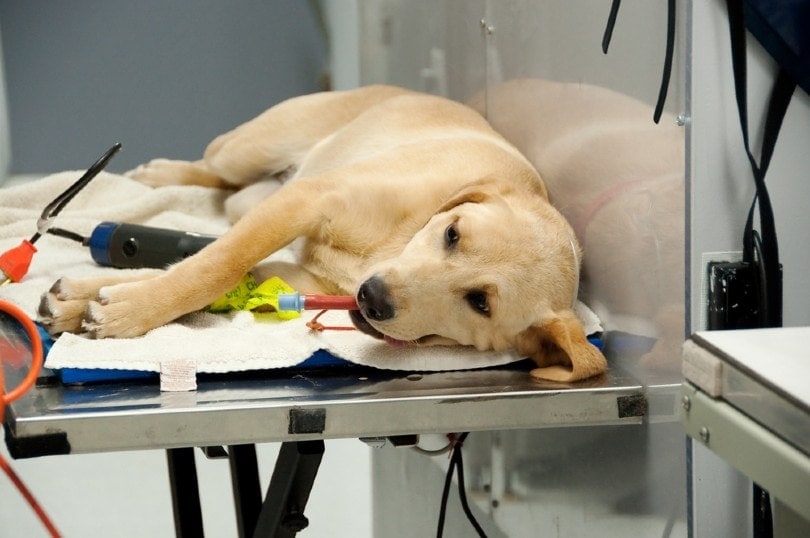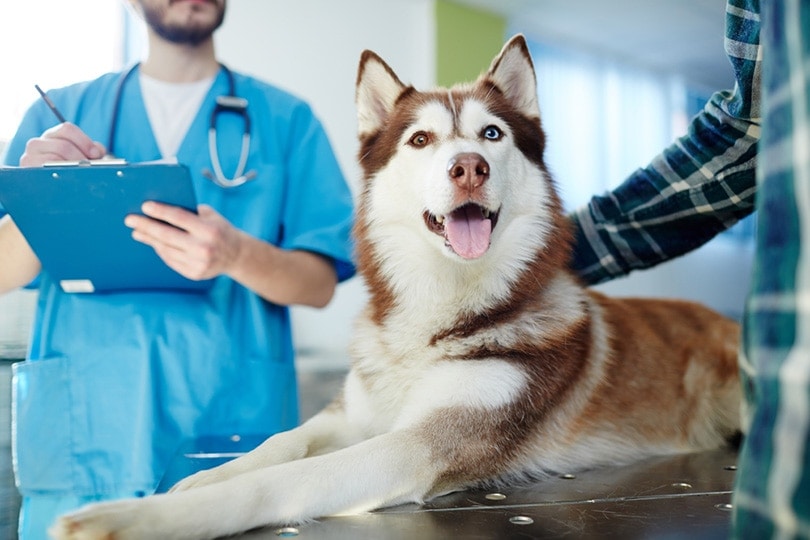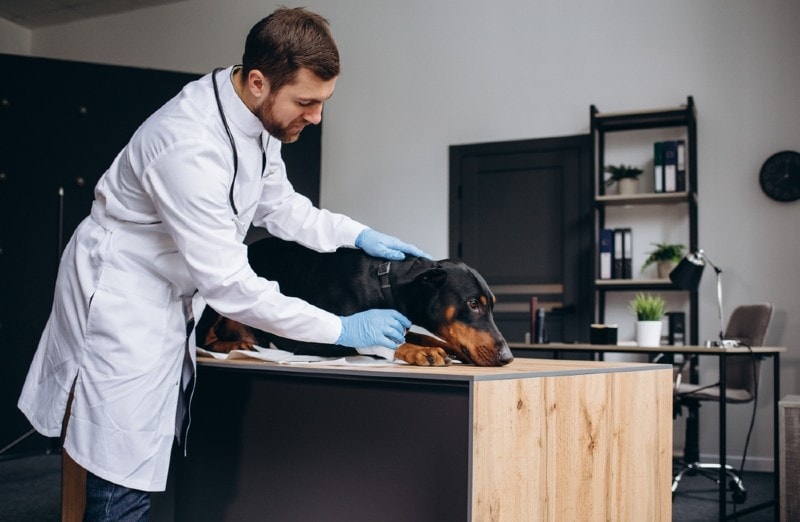How Long Does It Take to Neuter a Dog? Vet-Reviewed Facts, Pros & Cons

By Misty Layne
Updated on

If you’ve just adopted a male puppy, you know the time to neuter them isn’t far off. However, you might have some questions about the process (especially if it’s your first time having an animal fixed). Like, how long does it take to neuter a dog?
Not long, actually! In fact, it takes around 15 to 20 minutes of surgical time, with a bit more with preparation and recovery times.
Other than the length of time it takes to neuter your pet, you may be curious as to what age they need to be neutered, along with what the benefits and risks may be. No worries, because we’ve got you covered below with the basics of dog neutering!
What Happens When Your Dog is Neutered?
The procedure of neutering starts with your dog having pain relief and sedatives administered so that they are calm and relaxed before surgery. They will be prepared for anesthesia and the surgical site clipped and cleaned. (If your dog is mucky it is a good idea to bathe them the day before surgery to get rid of any mud and potential wound contaminants.) The anesthetic agents are given and once your dog is ready the veterinarian will perform surgery to remove the testicles. The wound is stitched up and your dog transferred to recovery to wake from the anesthetic. A few hours later they will usually be ready to come home for some TLC.
Other neutering procedures are available such as vasectomy but this is not standard so discuss with your vet.

At What Age Should My Dog Be Neutered?
The age your male dog can be neutered may be dependent upon your vet. Technically, dogs can be neutered after they reach 8 weeks of age. However, some vets will recommend you wait until the dog has reached puberty (so closer to 6 months), and some may want to wait until they hit 12-24 months to ensure they’ve reached skeletal maturity in some large or giant breed dogs.
Does it really matter that much if your dog is neutered earlier or later? In many cases the timing doesn’t matter, but research has shown that there are some differences in certain breeds and sizes of dogs, so neutering earlier may cause health problems later, but as can neutering too late. Different dog breeds can reach sexual maturity and skeletal maturity at different ages. Also different breeds have different risk factors for cancers which can be affected by neutering age. This is why we recommend a conversation with your vet about your dog’s individual circumstances.
Benefits of Neutering
There are plenty of benefits to neutering your puppy. The most obvious one is that you won’t become a grandparent to any puppies, but the procedure offers your four-legged friend more benefits than that, such as:
- Making them less likely to get diseases of the prostate or testicular cancer
- Lessening the occurrence of behavioral problems related to testosterone, like aggression, roaming, marking, and humping
- The possibility of a calmer nature and fewer fights with other dogs
- Helping to not contribute to pet overpopulation
Risks of Neutering
Though neutering is a common and safe procedure, as with all types of surgery, there are a few risks, but the benefits far outweigh them. The majority of dogs will have no complications with being neutered. Younger animals have the least risk of having any complications, while those that are older (particularly if they have underlying health issues) have a higher risk.
- A reaction to the anesthesia used during neutering (extremely rare; those with heart murmurs or issues with the kidney or liver are more prone to reacting negatively)
- Infection or inflammation of the incision site (more likely if your dog licks the incision frequently or is active post-surgery)
- Incision reopening, same reasons as above
- Bleeding (clotting disorders, parasite infections, rodenticide toxicity)
The majority of these risks can be alleviated by keeping your pet from licking at the incision site (hello, Cone of Shame!) and keeping them quiet and less active in the days following surgery. Keeping an eye on the incision site to check for any bleeding or signs of infection will help as well.
If you have concerns about getting your dog neutered (especially if they have an underlying medical condition), talk to your vet first.

Final Thoughts
The actual act of neutering a dog takes very little time—only 15–20 minutes! However, recovery will take a few days and wound healing around 7-14 days, and you’ll need to keep an eye on your pup so they don’t irritate the incision site by licking or biting at it. The age you should have your pet neutered will depend upon yourself, your dog’s needs, and your vet.
And though there are a few risks associated with neutering, the benefits are far greater. Most dogs will be perfectly fine having this surgery, so don’t overthink it. But do speak to your veterinarian about any concerns you may have.
See also:
Featured Photo Credit: aspen rock, Shutterstock














